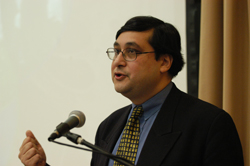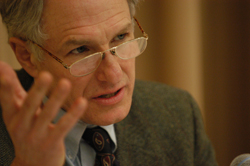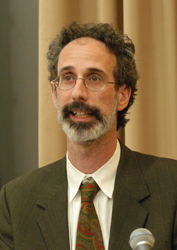Water as a Source of Conflict and Cooperation: Exploring the Potential February 26-27, 2005 | Tufts University Schedule Saturday, February 26, 2005
Sunday, February 27, 2005
Workshop Participants
Gershon Baskin. Founder and co-Director of the Israel/Palestine Center for Research and Information (IPCRI), the only joint Israeli-Palestinian think-tank in the world. There work focuses on strategic analysis, law and development, environment and water, Pathways Into Reconciliation and Joint Environmental Mediation Services. Ken Conca. University of Maryland. Associate Professor in the Department of Government and Politics, Faculty Affiliate in the School of Public Policy and Director of the Program on the Future Global Agenda. Professor Conca currently has research projects regarding the governance of water resources and the evolution of international legal norms for shared river basins. Joseph Dellapenna. Professor at the Villanova University School of Law where his research and teaching interests focus on water rights, Chinese law, international law, comparative law, conflicts of law, and admiralty. Professor Dellapenna has written many books and scholarly articles on a broad range of constitutional, environmental and international subjects, including the article, ”The Iraqi Campaign Against the Marsh Arabs: Ecocide as Genocide” published by the University of Pittsburgh School of Law. Ousmane Dione. Senior Water Resources Management at the World Bank. As a member of the Africa Water Resources Management Initiative (AWRMI), is leading the current World Bank work in West and Central Africa with a particular focus on the Senegal and Niger River Basins. The author and coauthor of a several articles and technical papers published in some referenced revues such as les Cahiers d'Outre-Mer, Revue de Geographie de Lyon, Series ORSTOM and in the World Bank.
Shafiqul Islam. Professor of Civil and Environmental Engineering at Tufts University where he came in the Fall of 2004 as the First Bernard M. Gordon Senior Faculty Fellow in Engineering. He comes to Tufts from the University of Cincinnati, where he has been since completing his ScD from the Massachusetts Institute of Technology in 1991. His research and teaching emphasize interdisciplinary approaches to address contemporary problems of water and environment by focusing on scarcity and abundance of water. Noel Jacobs. Regional Project Director of the Mesoamerican Barrier Reef Systems Project based in Belize City, Belize. Served as a delegate to numerous international events, including the World Summit on Sustainable Development in Johannesburg, South Africa and special CITES and Inter-American Tropical Tuna Commission meetings. Served as the Director of the Lobster and Conch Resource Assessment Unit CARICOM Fisheries Resource Assessment and Management Program and Acting Fisheries Administrator for the Fisheries Department in the Ministry of Agriculture/Fisheries. Dennis Lettenmaier. Professor, Water Resource Engineering and Hydrology, University of Washington, Director, Surface Water Hydrology Research Group. In addition to his service at the University of Washington, he spent a year as visiting scientist at the U.S. Geological Survey in Reston, VA (1985-86) and was the Program Manager of NASA's Land Surface Hydrology Program at NASA Headquarters in 1997-98. He was a recipient of ASCE's Huber Research Prize in 1990, is a Fellow of the American Geophysical Union and American Meteorological Society, and is the author of over 100 journal articles. He is currently Chief Editor of the American Meteorological Society Journal of Hydrometeorology. Daene McKinney. Professor of Environmental Engineering at the University of Texas at Austin. He concentrates on research related to transboundary water and environmental issues, especially related to US-Mexico border issues in the Rio Grande basin and countries of Central Europe and the Former Soviet Union. Of particular interest to him is the relationship between economic development and environmental protection. McKinney has served as an environmental engineer for the U.S. Environmental Protection Agency and spent a two-year leave from UT Austin in Almaty, Kazakhstan as Chief of Party for the five-country USAID Environmental Policy and Institutions for Central Asia. Fred Pearce. Fred Pearce is a former news editor at New Scientist magazine, and currently the magazine's environment and development consultant. He is one of the world's leading writers on water. A decade ago, he published “The Dammed: rivers, dams and the coming world water crisis”. Besides New Scientist, he writes regularly for The Independent and the Times High Education Supplement in the UK, and the Boston Globe and Foreign Policy in the US. He is syndicated in Japan, Australia and elsewhere. He has filed articles from more than 50 countries in the past decade. Mihaela Popovici. Technical Expert of Water Management at the International Commission for the Protection of Danube River (ICPDR). Has worked for the Ministry of Environment and Water Management, as the head of Water Strategy and Legislation Division as well as advisor to the minister on water and environmental economics issues. She has published in the area of environmental economics and in the broader area of water resources management. She has co-coordinated and participated in a number of EC funded research projects on integrated water management. Syed Ayub Qutub. President of the Pakistan Institute of Environment-Development Action Research. Peter Rogers. Prof. Rogers is Gordon McKay Professor of Environmental Engineering and Professor of City Planning in the Division of Engineering and Applied Sciences at Harvard University. He is a member of the Technical Advisory Committee of the Global Water Partnership, recipient of Guggenheim and Twentieth Century Fellowships. He has carried out extensive field and model studies on population, water and energy resources, and environmental problems in Costa Rica, Pakistan, India, China, the Philippines, Bangladesh and, to a lesser extent, in 25 other countries. His most recent work has focused on the relationship between Chinese electric power developments and their impact on global warming. Anthony Turton. Gibb-SERA Chair in Integrated Water Resource Management at the Council for Scientific and Industrial Research (CSIR) and the University of Pretoria. Is currently the President of the Universities Partnership for Transboundary Waters (UPTW). This is a network of ten Universities on five continents that all specialize in transboundary water resource management. He is also involved with research at the CSIR related to understanding governance processes and structures in emerging democracies.
|
||||||||||||||||||||||||
 Adil Najam. Prof. Adil Najam teaches
international negotiation and diplomacy at the Fletcher School of Law
and Diplomacy (Tufts University, USA). His research and teaching focuses
on issues related to international environmental negotiations, human
security, trade and environment, policy roles of NGOs, global climate
change; all with a particular focus on developing country concerns.
He has published widely in the leading journals of these fields and
his recent books include ‘Civic Entrepreneurship’ (with
Tariq Banuri, seven volumes, 2002) and ‘Environment, Development
and Human Security: Perspectives from South Asia’ (Editor, 2003).
He holds two Masters and a PhD from the Massachusetts Institute of Technology
(MIT) and a Specialization in Negotiation from the Program on Negotiation
at the Harvard Law School. He is a past winner of the Fletcher School
of Law and Diplomacy Teaching Award, the MIT Goodwin Medal for Excellence
in Teaching, the Stien Rokan Award of the International Political Science
Association, and the Emerging Scholar Award of the Association for Research
on Nonprofit and Voluntary Association. He serves on the Boards of the
Pakistan Institute for Environment-Development Action Research (PIEDAR),
the Centre for Global Studies at the University of Victoria, and the
Pardee Center for the Study of the Longer Range Future and is a Visiting
Fellow at the Sustainable Development Policy Institute, Pakistan. He
also serves on the editorial boards of the journals ‘Ecological
Economics’, ‘Nonprofit and Voluntary Studies Quarterly’ and
the ‘Yearbook of International Cooperation on Environment and Development.
Adil Najam. Prof. Adil Najam teaches
international negotiation and diplomacy at the Fletcher School of Law
and Diplomacy (Tufts University, USA). His research and teaching focuses
on issues related to international environmental negotiations, human
security, trade and environment, policy roles of NGOs, global climate
change; all with a particular focus on developing country concerns.
He has published widely in the leading journals of these fields and
his recent books include ‘Civic Entrepreneurship’ (with
Tariq Banuri, seven volumes, 2002) and ‘Environment, Development
and Human Security: Perspectives from South Asia’ (Editor, 2003).
He holds two Masters and a PhD from the Massachusetts Institute of Technology
(MIT) and a Specialization in Negotiation from the Program on Negotiation
at the Harvard Law School. He is a past winner of the Fletcher School
of Law and Diplomacy Teaching Award, the MIT Goodwin Medal for Excellence
in Teaching, the Stien Rokan Award of the International Political Science
Association, and the Emerging Scholar Award of the Association for Research
on Nonprofit and Voluntary Association. He serves on the Boards of the
Pakistan Institute for Environment-Development Action Research (PIEDAR),
the Centre for Global Studies at the University of Victoria, and the
Pardee Center for the Study of the Longer Range Future and is a Visiting
Fellow at the Sustainable Development Policy Institute, Pakistan. He
also serves on the editorial boards of the journals ‘Ecological
Economics’, ‘Nonprofit and Voluntary Studies Quarterly’ and
the ‘Yearbook of International Cooperation on Environment and Development.  Paul Kirshen. Dr. Paul Kirshen is Research Professor in the Civil and
Environmental Engineering Department and Fletcher School of Law and Diplomacy
at Tufts University. He also is Director of the Water: Systems, Science
and Society (WSSS) Interdisciplinary Research and Graduate Education
Program. Prior to joining Tufts in 1996 he was an independent consultant
and also worked for a resource policy institute. He received his ScB
from Brown University and his MS and PhD from MIT. At Tufts he conducts
research in developed and developing countries on integrated water resources
management, climate change impacts and adaptation, water resources operations,
decision support systems, and hydrology and teaches water resources engineering
and integrated water resources management.
Paul Kirshen. Dr. Paul Kirshen is Research Professor in the Civil and
Environmental Engineering Department and Fletcher School of Law and Diplomacy
at Tufts University. He also is Director of the Water: Systems, Science
and Society (WSSS) Interdisciplinary Research and Graduate Education
Program. Prior to joining Tufts in 1996 he was an independent consultant
and also worked for a resource policy institute. He received his ScB
from Brown University and his MS and PhD from MIT. At Tufts he conducts
research in developed and developing countries on integrated water resources
management, climate change impacts and adaptation, water resources operations,
decision support systems, and hydrology and teaches water resources engineering
and integrated water resources management.  Peter Gleick. Dr. Peter H. Gleick is co-founder and President of the
Pacific Institute for Studies in Development, Environment, and Security
in Oakland, California. His research and writing address the critical
connections between water and human health, the hydrologic impacts of
climate change, sustainable water use, privatization and globalization,
and international conflicts over water resources. Dr. Gleick is an internationally
recognized water expert and was named a MacArthur Fellow in October 2003
for his work. In 1999, was elected an Academician of the International
Water Academy, in Oslo, Norway. He serves on the boards of numerous journals
and organizations, and is the author of many scientific papers and four
books, including the biennial water report, The World's Water, published
by Island Press (Washington, D.C.).
Peter Gleick. Dr. Peter H. Gleick is co-founder and President of the
Pacific Institute for Studies in Development, Environment, and Security
in Oakland, California. His research and writing address the critical
connections between water and human health, the hydrologic impacts of
climate change, sustainable water use, privatization and globalization,
and international conflicts over water resources. Dr. Gleick is an internationally
recognized water expert and was named a MacArthur Fellow in October 2003
for his work. In 1999, was elected an Academician of the International
Water Academy, in Oslo, Norway. He serves on the boards of numerous journals
and organizations, and is the author of many scientific papers and four
books, including the biennial water report, The World's Water, published
by Island Press (Washington, D.C.).